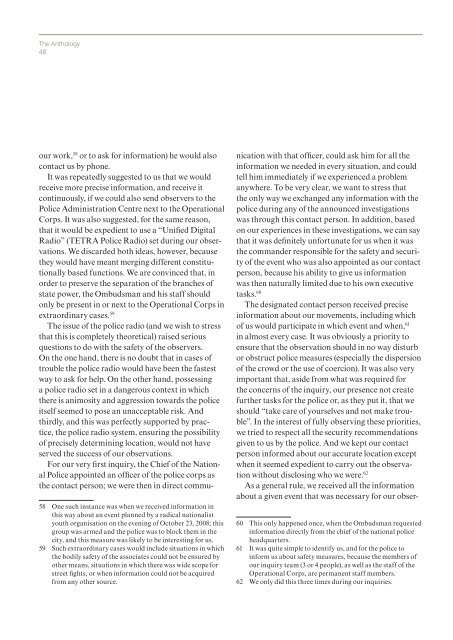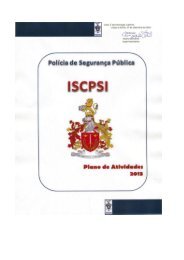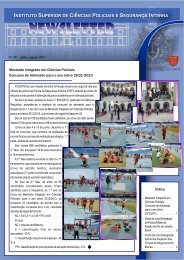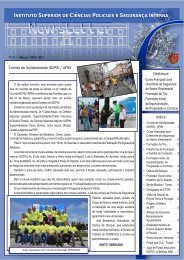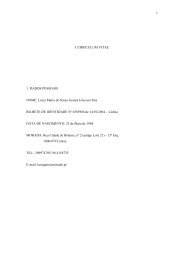The Anthology
The Anthology
The Anthology
You also want an ePaper? Increase the reach of your titles
YUMPU automatically turns print PDFs into web optimized ePapers that Google loves.
<strong>The</strong> <strong>Anthology</strong><br />
48<br />
our work, 58 or to ask for information) he would also<br />
contact us by phone.<br />
It was repeatedly suggested to us that we would<br />
receive more precise information, and receive it<br />
continuously, if we could also send observers to the<br />
Police Administration Centre next to the Operational<br />
Corps. It was also suggested, for the same reason,<br />
that it would be expedient to use a “Unified Digital<br />
Radio” (TETRA Police Radio) set during our observations.<br />
We discarded both ideas, however, because<br />
they would have meant merging different constitutionally<br />
based functions. We are convinced that, in<br />
order to preserve the separation of the branches of<br />
state power, the Ombudsman and his staff should<br />
only be present in or next to the Operational Corps in<br />
extraordinary cases. 59<br />
<strong>The</strong> issue of the police radio (and we wish to stress<br />
that this is completely theoretical) raised serious<br />
questions to do with the safety of the observers.<br />
On the one hand, there is no doubt that in cases of<br />
trouble the police radio would have been the fastest<br />
way to ask for help. On the other hand, possessing<br />
a police radio set in a dangerous context in which<br />
there is animosity and aggression towards the police<br />
itself seemed to pose an unacceptable risk. And<br />
thirdly, and this was perfectly supported by practice,<br />
the police radio system, ensuring the possibility<br />
of precisely determining location, would not have<br />
served the success of our observations.<br />
For our very first inquiry, the Chief of the National<br />
Police appointed an officer of the police corps as<br />
the contact person; we were then in direct commu-<br />
58 One such instance was when we received information in<br />
this way about an event planned by a radical nationalist<br />
youth organisation on the evening of October 23, 2008; this<br />
group was armed and the police was to block them in the<br />
city, and this measure was likely to be interesting for us.<br />
59 Such extraordinary cases would include situations in which<br />
the bodily safety of the associates could not be ensured by<br />
other means, situations in which there was wide scope for<br />
street fights, or when information could not be acquired<br />
from any other source.<br />
nication with that officer, could ask him for all the<br />
information we needed in every situation, and could<br />
tell him immediately if we experienced a problem<br />
anywhere. To be very clear, we want to stress that<br />
the only way we exchanged any information with the<br />
police during any of the announced investigations<br />
was through this contact person. In addition, based<br />
on our experiences in these investigations, we can say<br />
that it was definitely unfortunate for us when it was<br />
the commander responsible for the safety and security<br />
of the event who was also appointed as our contact<br />
person, because his ability to give us information<br />
was then naturally limited due to his own executive<br />
tasks. 60<br />
<strong>The</strong> designated contact person received precise<br />
information about our movements, including which<br />
of us would participate in which event and when, 61<br />
in almost every case. It was obviously a priority to<br />
ensure that the observation should in no way disturb<br />
or obstruct police measures (especially the dispersion<br />
of the crowd or the use of coercion). It was also very<br />
important that, aside from what was required for<br />
the concerns of the inquiry, our presence not create<br />
further tasks for the police or, as they put it, that we<br />
should “take care of yourselves and not make trouble”.<br />
In the interest of fully observing these priorities,<br />
we tried to respect all the security recommendations<br />
given to us by the police. And we kept our contact<br />
person informed about our accurate location except<br />
when it seemed expedient to carry out the observation<br />
without disclosing who we were. 62<br />
As a general rule, we received all the information<br />
about a given event that was necessary for our obser-<br />
60 This only happened once, when the Ombudsman requested<br />
information directly from the chief of the national police<br />
headquarters.<br />
61 It was quite simple to identify us, and for the police to<br />
inform us about safety measures, because the members of<br />
our inquiry team (3 or 4 people), as well as the staff of the<br />
Operational Corps, are permanent staff members.<br />
62 We only did this three times during our inquiries.


